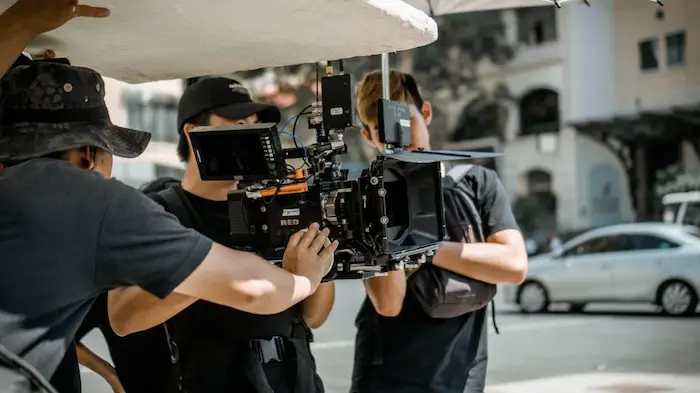
After witnessing the success of some of your favorite movies, you may be probably wondering what happens behind every production. The fact is, making a movie comes with its burdens and a whole lot of behind-the-scenes activities. Every production cycle has stages it must pass through, some even spanning over the entire filmmaking process. However, each stage has specific tasks to be completed before a movie is declared ready for audience screening.
What is Film Production?

Film production entails a long process of creating and making a movie. Depending on the amount of work needed, the process can take a year or even more than that time. Successful production of any given film is a demanding process that requires maximum attention and effort from all teams involved.
The entire film production process deals with different responsibilities at different times. For all these functions to succeed, superior coordination from the production manager is needed to achieve excellent output. Below is an outline of some of the stages a filmmaking and production process goes through.
1. Script Development Stage

The script development stage is the initial step in any film production process where the whole movie idea is born. This stage serves as the backbone to the entire film and determines whether the film will sell or not.
Successful scriptwriters often argue that a good movie script has to be inspired by real-life events. Essentially, some of the greatest movies to ever grace our screens are ideas born out of real existence. For instance, you’ll often find that movies about gambling are inspired by real-life casino experiences the movie writer had.
Better yet, such a scriptwriter needs some casino experience to bring out the whole idea into perfection. Well, if you’re a movie writer wishing to create a blockbuster film on gambling, there are many places to draw inspiration from. If you click here, you’ll find a list of casinos that’ll expose you to the real-life casino experience. Alternatively, books are also a rich hunting ground for great movie ideas.
Script development is a crucial phase in filmmaking, and you need to have the right inspiration when writing one. Depending on the movie type, this development stage can last for months or even years.
2. Budgeting for the Movie

Investing in the idea born through the script is the second phase of filmmaking. This stage mainly revolves around establishing how much is required to create something out of the concept. It’s considered a critical phase that allows all the parties to agree on funding before venturing too deep into the filmmaking process.
A few areas determine the basis for your budgeting. These include the amount required to play cast members, costs of the equipment, and other post-production costs that keep on popping. A well-thought-out budget will give birth to a good movie.
Movies that channel more funding into areas of great importance enjoy tremendous success. Such movies skip all the other unnecessary stuff that’s common in most production processes.
3. Pre-production stage

With the script and budget in place, the responsibility now rests on the production team to make things happen. This phase also comes with a clear outline of every other production expectation. There is also subsequent identification and assignment of roles to the cast.
While this may appear as a less demanding task, the production team has to put in the right effort to get everything right. For instance, the type of cast put in the available roles will significantly bear the movies’ success. In most cases, it’s considered ideal to seek film distributors’ counsel to identify the right cast for the target audience. The film’s set location is also determined at this stage.
4. Production Stage

The production phase is where the actual work begins. Here, the cast is already chosen, with all roles assigned. This filmmaking phase is where every aspect comes together to actualize the film. It is usually the most demanding part of the entire movie-making process and needs maximum concentration from all crew members.
The main aim of the production phase is to bring life to the story idea. This can be through different ways, depending on what the movie is all about. For a film that inspires real-life change, the director has to guide the crew to bring out their roles with perfection. The same applies to other movies and their respective genres.
The production stage also has to involve a script supervisor who ensures efficient continuity of the movie scenes. They also work closely with the director to ensure the movie quality is up to the desired standards.
5. Post Production Phase

With the completion of the production phase, there’s still a lot to make the movie complete. This includes reviewing all the shot scenes and organizing them into a film. The movie editors have to seek guidance from the directors to determine which scenes need to be edited out. Other functions that come into play at this stage include picking music that fits into each set.
Another crucial post-production stage is marketing. This is a stage where film promoters have to create a buzz around the movie. Film festivals and social media marketing are a few avenues filmmakers use to market their films and draw all the attention.
You should also note that film marketing helps to attract attention to the movie. The buzz will translate to more viewership and increased reviews. This is the same reason why casinos also invest in positive reviews. Erik King, one of the leading gambling experts, has been helping many casinos in this sector. You can check out the biggest New Zealand casino guide to learn more about these casinos.
6. Distribution Phase
Distribution is the last and most crucial stage in film production. Regardless of how the movie is reviewed, it has to be distributed to enjoy financial success. If it lacks a good distribution edge, it will probably end up like any other ordinary movie.
Bottom Line
The process of making a movie from its development stage up to the final phase entails a lot of dedication. Moreover, cast members and the production team must work closely to guarantee pure entertainment to the viewer.


